Leonard Cohen's long-lasting impact on both music and literature can't be fully measured by the number of people who cover his songs or the frequency with which his music has been used in movies and TV shows.
That is partly because those things are superficial and only show a piece of how special and complex he was as an artist, not the whole story. His status in popular culture has been forever determined by his 14 studio albums.
His records centred on subjects like faith, longing, and mortality and explored themes of God, love, and doubt, all mixed with pain and wisdom. Some artists avoided hard topics, but Cohen often picked up ideas from death, making it look easy when it was anything but.
His honesty stood out, and the reason his music is different is that he didn't act based on what he thought and what he wanted or failed to get; instead, he always chose words as if every one had to count. He built worlds with his music, performing not just music but a dialogue with people who listen, and each album is like a piece of a long conversation.
If anyone wants to really get what Leonard Cohen got from the job, it's the lesser-known songs that Leonard Cohen wrote, where people find even bigger rewards and more difficult questions; it is also where his most lasting truths can be heard.
This way of always trying to grow as an artist made Cohen's discography not just wide, but also really layered. Each album seemed like it showed a different Leonard Cohen, maybe most evident in albums like Songs of Love and Hate (1971) or Various Positions (1984), which were about longing and wanting, while other later albums like You Want It Darker (2016) had people facing death with a strange calm and a kind of hope, or trying to make something that felt close and real.
This was the work that made him stand out as an artist. The songs he wrote weren't done for everybody to like, and he didn't change them just because something changed. He wrote them so they should last a long time, and people noticed that after listening a few times, the songs got heavier.
Grace could always be found somewhere quiet, hidden under all the sadness, worry, or loss, his music often dealing with this kind of stuff. Because even when everything is broken, there is still beauty left somewhere.
Disclaimer: This article contains the writer's opinion. The reader's discretion is advised!
Here are the top 6 Leonard Cohen songs of all time
Here are the top 6 Leonard Cohen songs of all time, and these are the pieces that make his music feel so special, his voice and all of his words. Far From God, where faith mixes with desire, ticks all the boxes, like no other song does. It's followed by songs that came much later, like You Want It Darker, which was made as if he were saying goodbye and not scared of what's after.
This collection hasn't been made to just count up which was most popular, but instead it is more like going down a road through the feelings and questions that made Leonard Cohen respected for writing songs people remember. We listen to these and sometimes feel heavy, and sometimes the ache does get heavy.
1) Hallelujah
Leonard Cohen's Hallelujah became a go-to emotional song for film and television, used like some famous landmark of music; something quietly discovered, and people kept covering it so many times, making it a regular soundtrack in dramatic scenes. Even after all this, the song's first version by Leonard Cohen somehow became hard to ignore, so it stands strong.
That's strange, isn't it? Leonard Cohen's original has never really managed to bring some kind of sharp clarity, since it's more about being lost right in the middle, not really knowing where to stand.
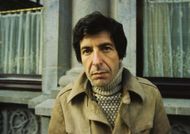
Hallelujah doesn't just go out to confirm faith, it waits in all the uncertainty. Leonard Cohen showed faith to not be some finished or clean thing, nope, he showed it as being easy to break, always shifting with everything. It's not an emotional song where everyone celebrates divine victory, but more like a quiet thinking about how the sacred can sometimes feel complete and can also be broken at the same time.
Easy answers are not given by the song. The meaning keeps getting its own questions, and Hallelujah, by doing this, touches on something that belongs to everyone, because when people hear it, they can feel that they want to love someone who seems a bit too far to reach.
Read More: 10 times Rihanna dominated the stage like a true queen
2) Suzanne
Suzanne, the opening track on Leonard Cohen's 1967 debut album Songs of Leonard Cohen (1967), gives people an early peek into the kind of poetic mind that would later shape his music career. Leonard Cohen was a poet and novelist long before he ever started to play guitar or sing songs to other people.
At some point, his lyrical maturity surprised a lot of folks. His lyrics weren't like other artists who sometimes need a while to find their voice. Suzanne tells a story that slowly moves between things that feel sacred and things that feel ordinary; the spiritual gets mixed with the sensual air around it.
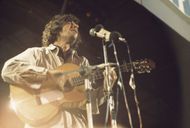
Leonard Cohen uses vivid, almost tangible pictures in the words, and instead of just tossing in biblical verses, he paints a close-up picture of how people can feel connected, mixed with some kind of longing for something more.
Leonard Cohen's songwriting style is known for this duality, he would put spiritual symbols into stories that were shaped by personal experience, which set him apart. By the time Suzanne was written, Leonard Cohen wasn't just making up another song for the radio, because what he wrote was something almost like a sermon, but one you have to hear in a whisper.
Read More: Top 7 Queen Latifah songs that showcase her iconic versatility
3) Famous Blue Raincoat
Leonard Cohen's Famous Blue Raincoat, from his 1971 album Songs of Love and Hate, isn't only about a love triangle, but it's more about people picking up the pieces when it's all over and nothing fits right anymore. And you can't paint him as some tragic hero or as a person who just had everything taken from him, with the whole thing more like a letter that's full of someone just giving up and feeling sorry for someone else, even when it hurts.
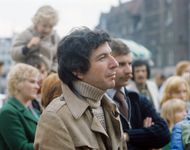
What makes this song really hit hard isn’t only what it says, but also how there's no answer, and it just kind of hangs in the middle of things, like questions you forgot to ask. He seems to have found some peace with someone else, while still feeling a burning feeling that maybe he's the one who got left out in ways that hurt more than words.
So the betrayal and remembering stick because of that old raincoat, torn and tired, and everyone is just left thinking about what got broken, not how to fix it.
Read More: The top 7 most covered songs in music history
4) Bird on the Wire
Leonard Cohen's 1969 album Songs from a Room includes the memorable track Bird on the Wire, which holds attention with its raw honesty and straightforward delivery. This song steps away from the rich, layered poetry often seen in Cohen's other work and focuses on emotional simplicity. It explores themes of guilt, the search for freedom, and the path to redemption.
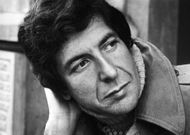
What makes the piece powerful is not fancy imagery, but its personal and open-hearted tone, which feels easy to connect with. The opening line, "like a drunk in a midnight choir, I have tried in my way to be free", left such a deep impression that Kris Kristofferson wanted those words on his tombstone, showing how much the song continues to mean to people.
Read More: 8 timeless Eagles songs that changed the face of American rock
5) Tower of Song
Leonard Cohen's Tower of Song, on his 1988 album I'm Your Man, shows a strange mix of looking back on himself and a kind of quiet humor. Being older takes its toll on a person and leaves marks on their life as an artist and their work.
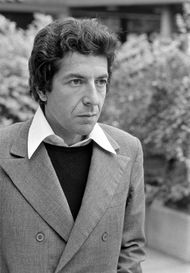
The lyrics are funny in a way, and listeners can hear how he jokes about his low-pitched singing and even makes fun of his own writing. Cohen talks about not taking himself seriously and how energy and excitement slowly disappear from a person's life. It can be heard clearly when he says, "I ache in the places where I used to play."
The song is given a certain balance between Cohen's jokes and how he does not hide his gentle sadness, so Tower of Song comes out with a special touch, making people who hear it feel the bittersweet aspects of life.
Read More: The legacy of Led Zeppelin: A journey through rock history
6) Anthem
On Leonard Cohen's 1992 album The Future, a record shadowed by end-of-days anxieties, lies a revelation, the kind of song that stands out because it feels honest and a bit angry. Rather than giving any kind of escape, the song acknowledges the brokenness of the world and does so with honesty: "There is a crack, a crack in everything / That's how the light gets in."

It sort of distills what Cohen's work became about in his later years. Cohen's idea was simple: to try and find any sort of grace out there. While other songs on the album are grappling with chaos, violence, and decay, there is a paradoxical comfort offered by Anthem.
Even redemption and forgiveness seem so strange, but it’s what makes the song special, and some people have found the words etched in their memories long after.
Read More: The legacy of Led Zeppelin: A journey through rock history
Leonard Cohen's albums dive deep into what it means to be human, mixing themes like love, faith, loss, politics, and dying through crafted words. Over the years, his music shifted its sound and style, starting with the haunting folk simplicity of Songs of Leonard Cohen, moving to the moody electronic vibes of I'm Your Man, and reaching the reflective and spiritual tones of You Want It Darker.
His voice, always personal, stayed true to itself. Cohen did not avoid life's messy contradictions. He leaned into them, creating songs that felt part confession and part prayer. His impact lives not in his poetic lyrics or deep thoughts, but in how he allowed longing, doubt, and a sense of the divine to share space in his work.
Keep reading SoapCentral for more informative content!
Also Read: 8 Blackpink tracks that slay every time
